I acknowledge: finding, learning about, and integrating new marketing technologies is a challenge for marketers today. But as a new report from Wrike shows — How Marketers Get Things Done: The State of Agile Marketing in 2016 — it’s not the top challenge. It’s fifth. And a good ways below the top challenge.
The top five challenges marketers face:
- Developing creative, innovative campaigns that stand out in the market (37.2%)
- Moving fast enough to keep up with market changes and competitors (25.9%)
- Driving more revenue or sales for the company (24.7%)
- Doing more with fewer people and smaller budget than needed (24.4%)
- Finding, learning about, and integrating new marketing technologies (22.4%)
Based on my interactions with hundreds of marketers, these stats ring true.
I find that many commentators on the marketing technology landscape are quick to point out the problems there — too many choices and too much work to connect the pieces together — without stepping back to realize the context in which this landscape exists.
There’s a reason why there are so many vendors. And there’s a reason why marketers continue to purchase them and assemble marketing stacks tailored to their business.
And it’s not “shiny object syndrome.”
The explosion of marketing technology is a direct result of marketers striving to stand out in the market, keep up with market changes, drive more revenue, and be more effective with fewer resources.
The 5th most pressing challenge identified in Wrike’s study is a side effect of the first four challenges in front of it.
There are two other data points from the Wrike report that are important to note.
First, as a follow up to my post Did Morgan Stanley just kill the single-vendor marketing suite?, the majority of participants in Wrike’s study acknowledge that they use multiple tools:
Those stats include small marketing teams, which are more likely to to use fewer tools.
When Wrike breaks out the stats for large marketing teams, 38% use 7 or more tools.
And since the participants in this study came from a variety of different roles within marketing, this figure almost certainly underrepresents the number of tools used across the entire marketing department.
And when you consider that so many tools that are available as free or low-cost web apps or mobile apps — in social media and content marketing especially — that easily slip into a marketer’s workflow for specific tasks without much fanfare or integration requirements, these tool counts are pretty much guaranteed to be lower than what’s actually happening in practice.
But here’s the other point from the Wrike report that struck me:
When asked “how integrated are the different tools that you use on a regular basis?”, the vast majority of participants — 89.6% — reported that they are either:
- Very integrated — there are robust connections and data-sharing between tools (28.8%)
- Somewhat integrated — we have good integration between some of our tools (60.8%)
It’s certainly impressive that nearly 1/3 of the participants reported that their marketing technology tools are very integrated. But it’s also remarkable, frankly, that nearly 2/3 have good integraiton between some of their tools.
My takeaway: marketing technology integration is far from perfect, but heterogeneous marketing stacks are a lot more integrated today than they were a year or two ago.
While there’s certainly still work to be done — that’s why marketing technology is still listed as a challenge, albeit ranked 5th — it’s less often the “blocking factor” in marketing’s success. It could certainly be better, but it’s rarely the main thing holding us back.
In fact, a recent State of Digital Marketing Survey released by Ascend2 and Marketo quantified the things that are the most significant barriers to digital marketing success:
Of course, inadequate marketing budget (43%) is top of the list. But given the constraint of limited resources that is hard to escape, it’s interesting to note that the next top two barriers are:
- Lack of internal skills/training (39%)
- Lack of an effective strategy (36%)
Lack of marketing technology (25%) was last out of 7. Again, technology remains a challenge, but it’s not the leading challenge. On the contrary, technology may help overcome some of the other barriers on this list — inadequate analytics, inadequate data quality, inability to measure ROI.
But strategy, skills, and training are barriers that require much more human creativity and leadership to overcome. Those are the challenges that need our energy and imagination the most.
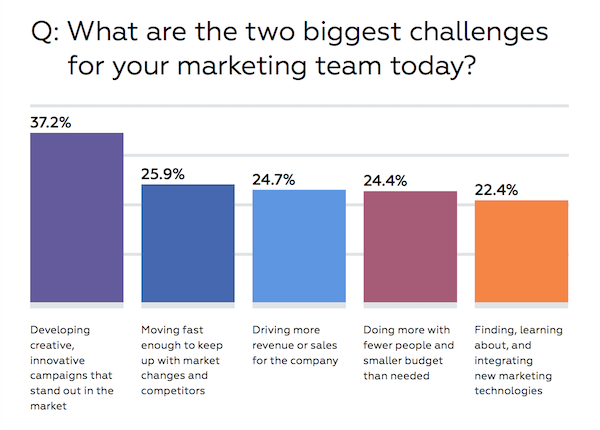
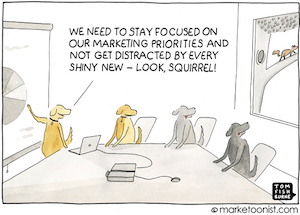
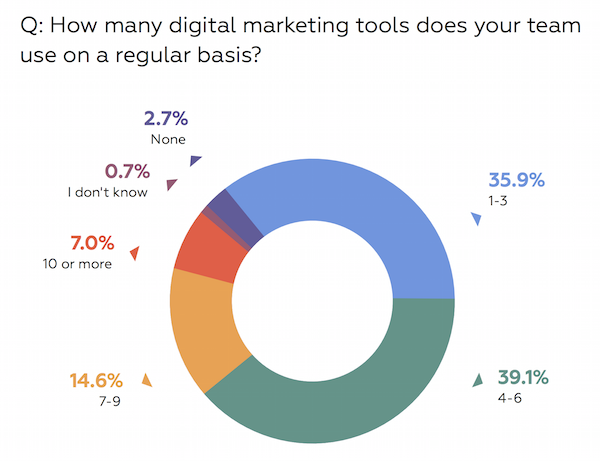
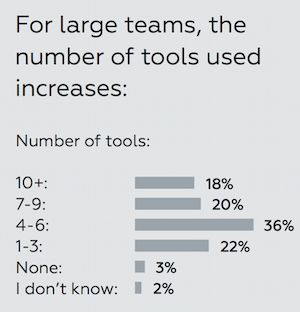
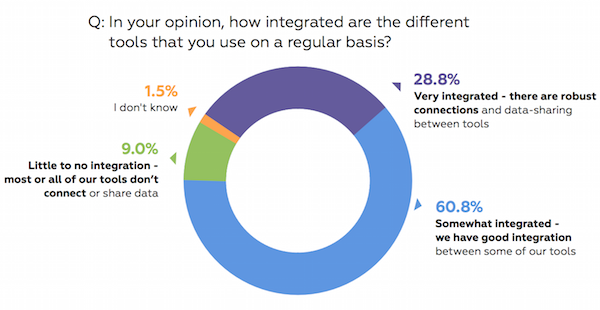
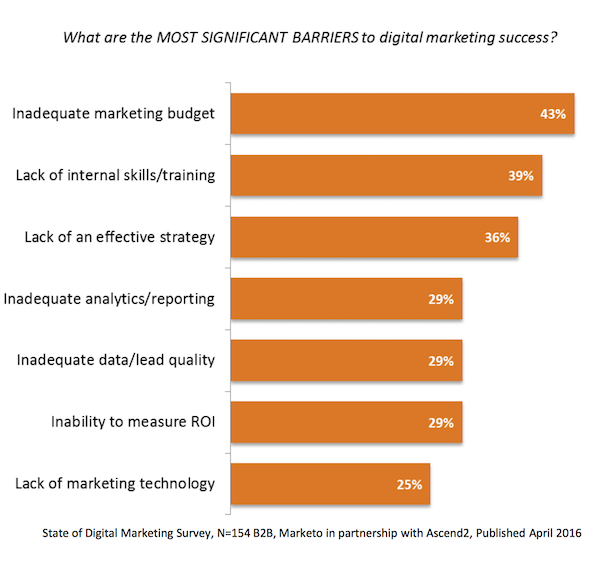
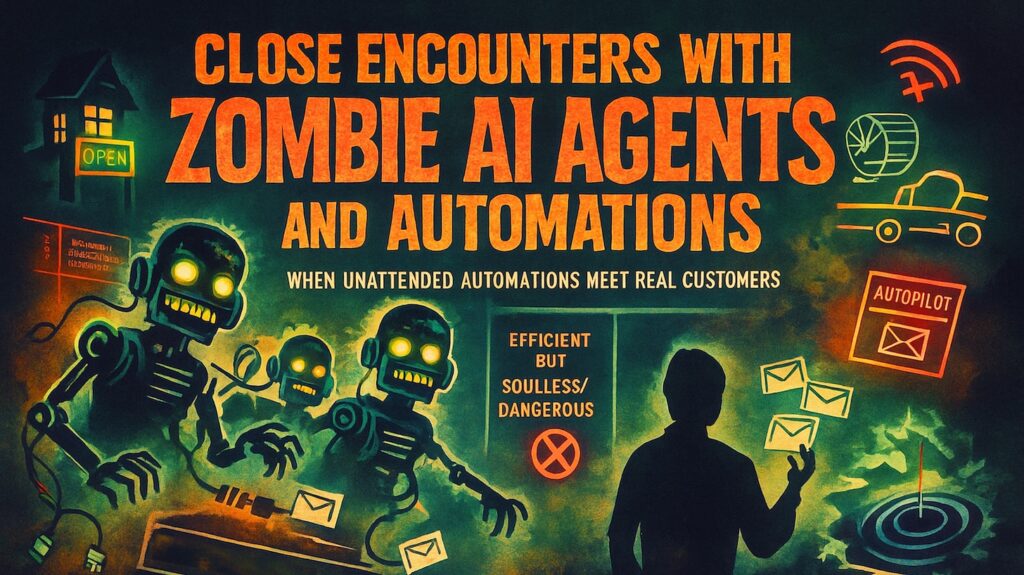

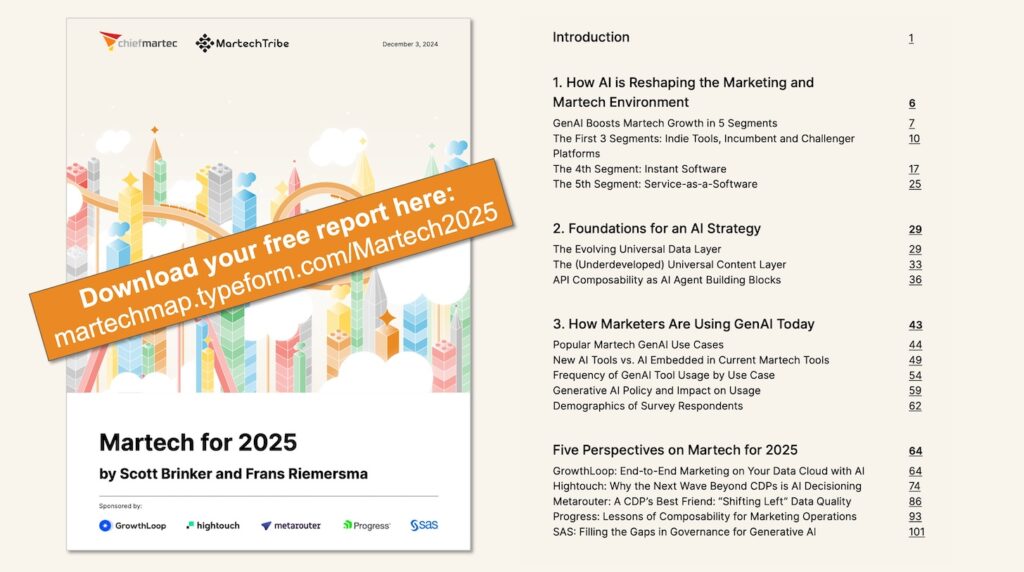
Nice post Scott! It’s nice to see some evidence point to some of the people and cultural challenges in delivering great marketing. Many organisations I have worked with have assumed that adopting technology will fix many of the challenges they face (which resonate with the research in this article). In reality, this is only part of the solution. Effort building a clear strategy and the right team are paramount to successfully adopting and utilising the right technology. At the end of the day MarTech is only a tool (or tools!) available to an organisation, and whilst an organisation may have the most and best tools available to them, producing quality and effective marketing is impossible without vision and skill.
Some interesting findings in this post.
When someone is complaining about a perceived lack of marketing technology I tend to ask the question of what they would do if they had it. If you had real-time analytics, what would do with the real-time data that can’t do with delayed data? If you could send automated multichannel campaigns, what would the communications plan look like? If you had a DMP what campaigns would you run?
Many of these questions return the marketer to designing experiences around the customer journey. Once the journey is well designed, you can quite often find that things can be prototyped using existing technology to check that it works.
Thanks as always for great thought provoking content.
David
With “Lack of internal skills/training (39%);” and “Lack of an effective strategy (36%),” it’s inevitable that shortcomings in “Marketing Technology (25%)” would be less a concern. You can’t know what you’re missing out on if you aren’t aware of the tools available — never mind the tools’ uses.
A decade plus of experience in consulting roles has shown me that the universal language that is marketing simply doesn’t exist. Marketing is almost too loose a term to apply to 21st Century business outreach and message creation.
Technologist; Analytics Specialist; Social Media Strategist… the list could go on and on. We’re seeing a splintering in “Marketing” that’s similar to the one we saw in the Humanities in the 70s.
Great post, btw.
From a broader perspective, I’m a bit disheartened that the top 5 did not include anything related to gaining a better understanding of the customer. Sometimes we assume we know what the customer wants/needs and skip right to the execution (spending) part of the process.
I agree with David’s comment that “…you can quite often find that things (e.g., Journeys) can be prototyped using existing technology…” Most companies – at least the large enterprises – have already made their marketing technology investments. “Rip and replace” is no longer viable to most companies. Connecting and complementing existing tools is the practical approach for marketing organizations.
Hey Scott
Today, the world is more about integrations and getting multiple things done from one place rather than going to different places. Technology is moving faster to make this happen. Integrations matter a lot today in all of the businesses to drive the best results.
Alex Pastore